Characters
People of Bhutan
Our documentary is the story of the people of Bhutan, from the ordinary to extraordinary, from young to old, from hardworking farmers to the royal family. Every one of them has hopes and dreams, fears and anxieties, and knows the real problems that come with modernization. We’ll use this space to tell you about them.
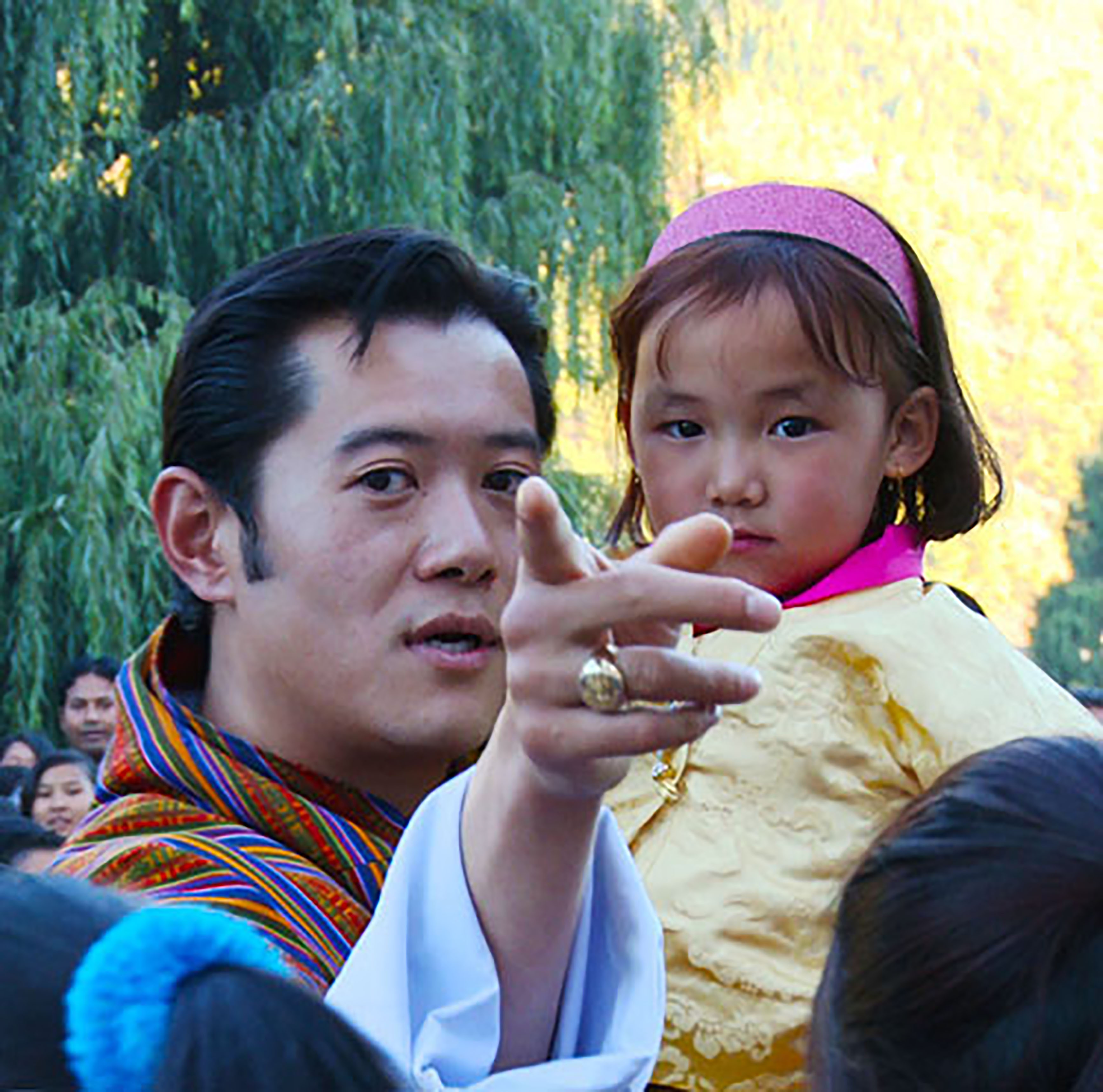
His Majesty, Jigme Khesar Namgyel Wangchuck
The Fifth Dragon King of Bhutan — affectionately known as “K Five” — His Majesty, Jigme Khesar Namgyel Wangchuck is head of the Wangchuck dynasty and the world’s youngest head of state. After completing his basic education in Bhutan, he studied at Phillips Academy (Andover), the Cushing Academy and Wheaton College in Massachusetts, and at Oxford University, where he completed the Foreign Service Program and an MPhil in Politics. The task facing him, now that Democracy has been formally adopted in his country, is unique and daunting. His Majesty has stated that the responsibility of his generation, the youth of Bhutan, is to ensure the success of democracy without sacrificing tradition and culture. Is this possible? Our HD footage of his coronation on the auspicious day of November 6th, his genuine interactions with his people and his compelling speech to his country are riveting.
Traditional Farmer
Ugyen has traveled from his farm in Paro by bus to attend the coronation in Thimphu. He knows that things are changing in Bhutan, including the way that he tends to his land. Still, Ugyen seems optimistic about the future. He believes in his new King.
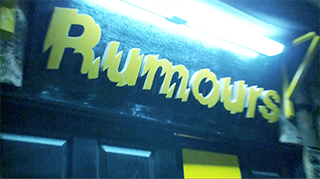
Om Bar
Om Bar in Thimphu is adjacent to a disco and karaoke pool hall. Western influence has penetrated the nightlife in Thimphu. Unlike their parents who grew up in isolation from the outside world, the youth are connected to the world through technology. Media cannot be avoided and its impact is visible.
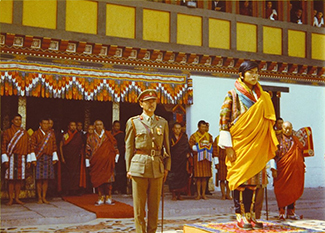
His Majesty, the Fourth King
His Majesty, the fourth King, Jigme Singye Wangchuck appeared in the May 8, 2006 issue of Time and was named as one of Time magazine’s 100 People Who Shape Our World in 2006. His reign is marked by phenomenal development. Roads and bridges, schools and hospitals, basic services in agriculture and livestock now reach deep into the remote corners of the country. Bhutan has also made tremendous progress in the field of communications, hydroelectric power development, financial sector, environmental protection, and industrial and infrastructural development during the king’s reign. His ‘revolutionary’ Buddhist views help us to understand the bridge between the medieval past and the future.
High School
Lhazin is a high school student living in Thimphu. Like many Bhutanese adolescents, Lhazin plans to attend college. While she is excited about the upcoming coronation, she is even more thrilled about the prospect of attending university overseas. She knows that Bhutan’s future is dependent upon the contributions of her generation.
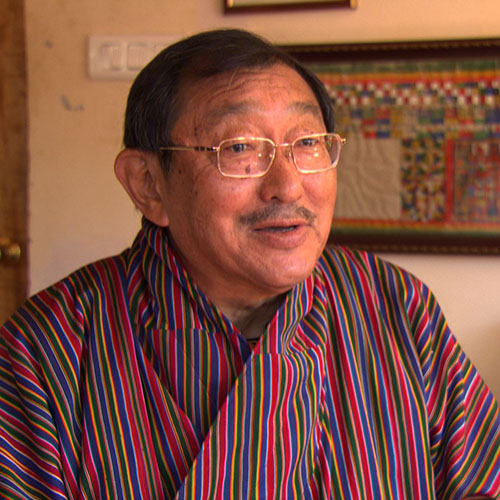
Dasho Paljor Dorji
The fourth king’s cousin, Dasho Paljor Dorji (or Benji, as he likes to be called) was instrumental in forming the first Bhutanese NGO—the “Royal Society for the Protection of Nature”. He candidly shares with us how he contributed to the development philosophy of Gross National Happiness and helped guide the devolution of power from absolute Monarchy to a constitutional Monarchy. He provides a compelling perspective as to why the Fourth King made such visionary decisions for his country and what challenges now face His Majesty, Jigme Khesar Namgyel Wangchuck.
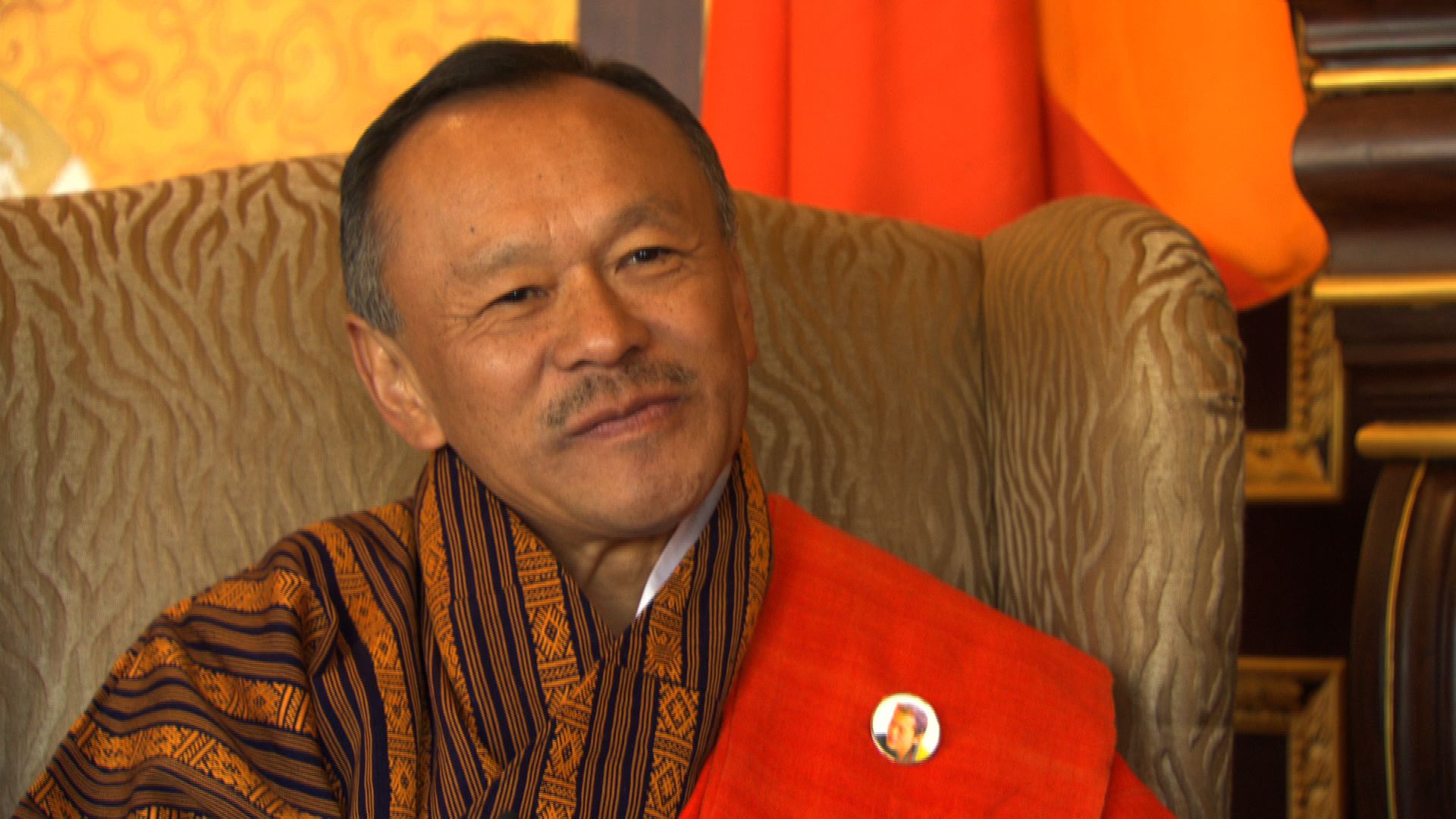
Lyonchen Jigme Yoser Thinley
Prime Minister Yoser said Bhutan has pursued a unique development path guided by the former King’s philosophy of Gross National Happiness since the early 1970s. Gross National Happiness emphasized a balanced life that matched the material needs of the body, with the spiritual, psychological and emotional needs of the mind. The Royal Government structured its development program on four broad themes: sustainable and equitable socio-economic development, not growth; environmental conservation; promotion of culture; and good governance. Despite growing problems like alcoholism and drug abuse, Prime Minister Yoser is hopeful about Bhutan’s future.

Consul Michael Rutland
The Honorary Consul of Bhutan to the United Kingdom and a former tutor to the Fourth King, Mr. Rutland believes that while Bhutan is indeed changing and confronting genuine issues, the optimism that prevails among the people will see the country through in the end.
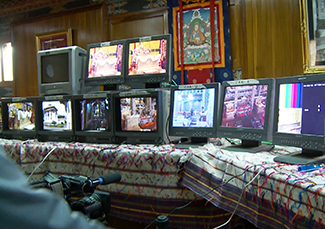
Bhutanese Broadcasting Service
The BBS broadcast the coronation to more than sixty thousand households that have a television set. Television was not introduced to Bhutan until 1999 and is still a government-controlled novelty. Our cameras followed Bhutanese Broadcasting Service crews and two producers throughout the Coronation ceremonies, to eavesdrop on their interviews and coverage.
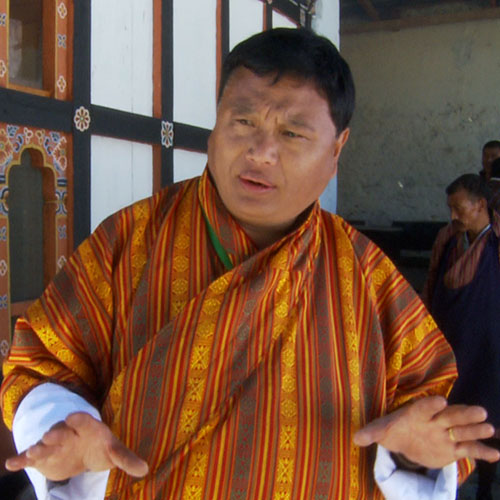
Chef Kelzang
Our cameras followed Chef Kelzang, Caterer, into the Royal Palace to partake in the makings of a coronation luncheon that will feed over 500 guests. Traditional Bhutanese fare of hot chili peppers and rice is combined with exotic treats from Thailand and India. The palace is bustling with preparation activities. Kelzang is responsible for every detail… and the decorations are even more elaborate than the food.
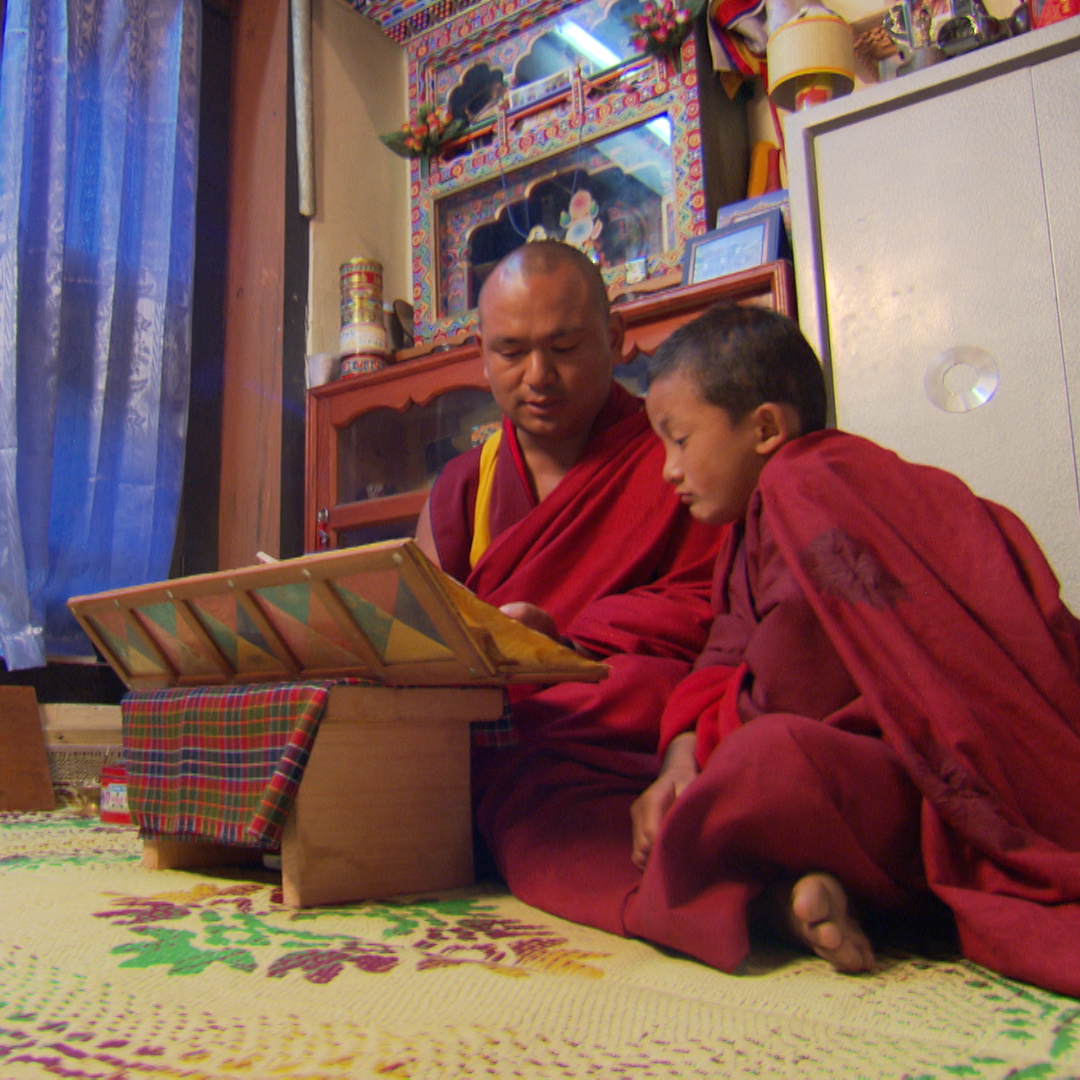
Lopon Yanka, Astrologer
Astrology plays a major role in all Bhutanese affairs. Days are deemed to be ‘auspicious’ or ‘inauspicious’ and the Bhutanese Observer prints detailed guidance, based upon the reader’s astrological sign and the portents of the day. The date and time of the King’s Coronation was divinely determined. Lopon Yanka is an Astrologer and head Professor at The Royal Astrology Institute. Through his eyes and insights, we begin to understand the great importance of astrology in the every day life of all Bhutanese citizens.
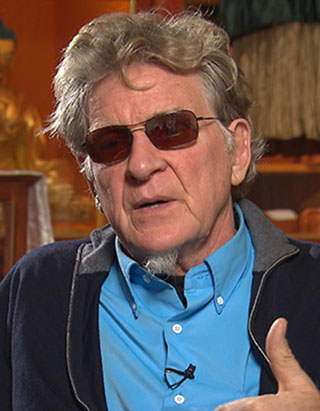
Dr. Robert Thurman
Dr. Robert Thurman, “Tenzin”, is the Jey Tsong Khapa professor of Indo-Tibetan Buddhist Studies at Columbia University, the President of Tibet House US, an educational nonprofit dedicated to preserve and promote the culture of Tibet, President of the American Institute of Buddhist Studies, and Editor-in-Chief of the Treasury of the Buddhist Sciences, a long-term translation and publication project of the Tibetan Tengyur canon. Author of over 20 books, his most recent publication is Why the Dalai Lama Matters: His Act of Truth as the Solution for China, Tibet, and the World. The NY Times Magazine refers him to as “The Dalai Lama’s man in America.” A close personal friend of His Holiness the 14th Dalai Lama for more than forty-five years, he is a former Tibetan Buddhist monk, co-founder with Richard Gere of Tibet House in New York City. Time magazine named him one of the “25 Most Influential Americans.” He has lectured all over the world; his charisma and enthusiasm draw packed audiences. His academic and popular writing explore the relevance and application of Tibetan Buddhism to contemporary thought and science, and world cultures and politics. He is a tireless advocate of justice and freedom for the Tibetan nation, within or without China. (www.bobthurman.com, www.tibethouse.org, www. menla.org, www.bobthurmanpodcast.com)